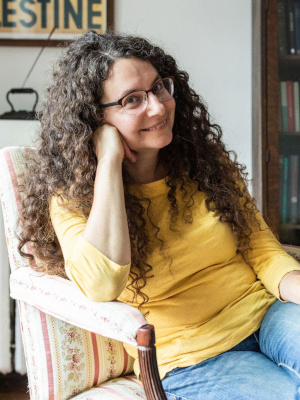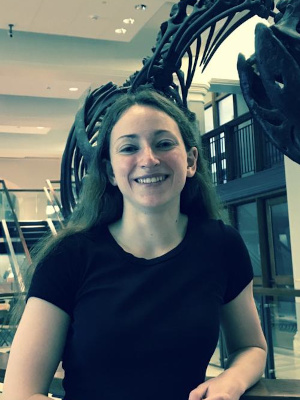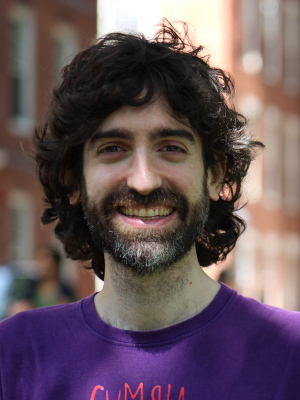Monday Panel: Headline Panel on Policy and Governance: Beyond the Brussels Effect: Competing Visions of AI Governance
Summary: While the EU’s AI Act has established a new regulatory template, competing governance models are emerging in both theory and practice — from market-driven self-regulation to state-led oversight, and from expert-driven risk frameworks to participatory and rights-based approaches. This panel examines how these divergent visions reflect deeper questions about democratic legitimacy and the role of expertise in AI policy, and what the implications of this governance diversity might be for effective AI oversight and other governance challenges.
Panel Chair: Ted Lechterman, Ph.D., UNESCO Chair in AI Ethics & Governance, IE University

Bio: Theodore “Ted” Lechterman holds the UNESCO Chair in AI Ethics & Governance at IE University in Spain, where he is Assistant Professor of Philosophy. His research spans political philosophy and applied ethics, focusing on artificial intelligence and democratic ideals, corporate responsibility in technology, and the ethics of private efforts to solve public problems. His scholarship appears in outlets such as Oxford Handbook of AI Governance, Stanford Encyclopedia of Philosophy, Journal of Business Ethics, Organization Studies, and History of Political Thought.
Lechterman is the author of The Tyranny of Generosity: Why Philanthropy Corrupts Our Politics and How We Can Fix It (Oxford University Press, 2022), which received an honorable mention for the ECPR Political Theory Prize. His second book, Recoding Democracy: AI and the Fight for Democracy’s Future, is under contract with Polity. His dynamic lecturing and dedication to student development have earned multiple teaching awards, while his innovations in AI ethics education have been recognized by the Financial Times, the QS Reimagine Education Awards, and the Government of Spain.
He serves as a member of UNESCO AI Ethics Experts Without Borders, officer of the ECPR Political Theory Standing Group, managing director of Compass Ethics, and co-chair of the 8th AAAI/ACM Conference on AI, Ethics, and Society. He regularly contributes to public debates and advises organizations on navigating ethical frontiers in business, technology, and governance. Lechterman holds degrees from Harvard (A.B.) and Princeton (M.A., Ph.D.) and completed postdoctoral fellowships at Stanford, Goethe University Frankfurt, the Hertie School, and the University of Oxford, where he was an inaugural fellow at the Institute for Ethics in AI.
Maria Eriksson PhD., Research Fellow, European Centre for Algorithmic Transparency; European Commission, Joint Research Centre
Bio: Maria Eriksson is a Research Fellow at the Joint Research Centre of the European Commission, based at the European Centre for Algorithmic Transparency (ECAT) in Seville, Spain. She is also an Affiliated Researcher at the Department of Arts and Cultural Sciences/Digital Cultures at Lund University, Sweden. Her research is located at the intersection of media studies, social anthropology, science and technology studies, and policy work. She has published extensively on the sociotechnical impacts of AI technologies, as well as the role of algorithmic systems within the cultural and creative industries. Currently, she contributes with scientific expertise to the European Commission’s implementation of the EU AI Act and Digital Services Act.
Maria will speak in her personal capacity as a researcher working at the Joint Research Centre, meaning, opinions and viewpoints should not, in any way, be interpreted as the official position of the European Commission.

David Leslie – Professor David Leslie, Director of Ethics and Responsible Innovation Research, The Alan Turing Institute, and Professor of Ethics, Technology and Society, QMUL
David Leslie is the Director of Ethics and Responsible Innovation Research at The Alan Turing Institute and Professor of Ethics, Technology and Society at Queen Mary University of London. He previously taught at Princeton’s University Center for Human Values, Yale’s programme in Ethics, Politics and Economics and at Harvard’s Committee on Degrees in Social Studies, where he received over a dozen teaching awards including the 2014 Stanley Hoffman Prize for Teaching Excellence. David is the author of the UK Government’s official guidance on the responsible design and implementation of AI systems in the public sector,Understanding artificial intelligence ethics and safety (2019) and a principal co-author of Explaining decisions made with AI (2020), a co-badged guidance on AI explainability published by the UK’s Information Commissioner’s Office and The Alan Turing Institute. After serving as an elected member of the Bureau of the Council of Europe’s (CoE) Ad Hoc Committee on Artificial Intelligence (CAHAI) (2021-2022), he was appointed, in 2022, as Specialist Advisor to the CoE’s Committee on AI where he has led the writing of its Human Rights, Democracy and the Rule of Law Impact Assessment for AI (2024), which accompanies its AI Convention. He also serves on UNESCO’s High-Level Expert Group steering the implementation of its Recommendation on the Ethics of Artificial Intelligence.

Urs Gasser – Professor and Dean, Technical University of Munich
Urs Gasser is a Professor of Public Policy at the Technical University of Munich (TUM), where he is also Dean of the TUM School of Social Sciences and Technology and Rector of the Munich School of Politics and Public Policy. Prior to joining TUM, he was the Executive Director of the Berkman Klein Center at Harvard University. Gasser has advised governments worldwide on technology policy, including serving on Angela Merkel’s Digital Council and as the current Chair of Thailand’s International Policy Advisory Panel on AI. He is also the co-author, with Viktor Mayer-Schönberger, of the book “Guardrails: Guiding Human Decisions in the Age of AI” (2024) and, with John Palfrey, of the “Advanced Introduction to Law and Digital Technologies” (2025).

Tuesday: Pedagogy Panel: How (and to Whom) Do We Teach AI Ethics?
Summary: The teaching of AI ethics—whether in a classroom or in a corporate setting— is challenging for several reasons. Even when students or colleagues approach the task with good will, many practical hurdles remain: how do we translate the modes of knowledge and inquiry that are necessary for this type of work to students (and colleagues) more accustomed to the high-information field of computer science? How do we balance our own moral intuitions and convictions against the work of thinking through the particulars of messy and challenging situations? How do we ensure that marginalized voices are not only included, but granted equal credence? This round table will encompass both fundamental questions of teaching philosophy and practical, concrete strategies that emerge from those philosophies.
Panel Chair: Emanuelle Burton, PhD., University of Illinois Chicago
Bio: Emanuelle Burton is senior lecturer in the department of computer science at the University of Illinois Chicago, where she teaches courses in ethics. She is coauthor of Computing and Technology Ethics: Engaging Through Science Fiction, published in 2023 by MIT Press, and solo author of several articles on ethics in fantasy literature for children. She holds a PhD in religion and literature from the University of Chicago Divinity School.

Panelist: Prof. Shannon Vallor, Baillie Gifford Chair in the Ethics of Data and Artificial Intelligence at the Edinburgh Futures Institute (EFI) at the University of Edinburgh.
Bio: Prof. Shannon Vallor is the Baillie Gifford Chair in the Ethics of Data and Artificial Intelligence at the Edinburgh Futures Institute (EFI) at the University of Edinburgh, where she is also appointed in Philosophy. She directs EFI’s Centre for Technomoral Futures, and is co-Director of the UKRI’s BRAID (Bridging Responsible AI Divides) programme. Professor Vallor’s research explores how AI and data science reshape human character and capabilities. From 2018-2020 she served as a Visiting Research Scientist and AI Ethicist at Google, and she is a standing member of Stanford University’s One Hundred Year Study of Artificial Intelligence (AI100). She is the author of Technology and the Virtues: A Philosophical Guide to a Future Worth Wanting (Oxford University Press, 2016) and The AI Mirror: How to Reclaim Our Humanity in an Age of Machine Thinking (Oxford University Press, 2024).

Panelist: Julienne LaChance, Ph.D., Senior Research Scientist at SonyAI
Bio: Julienne is a Senior Research Scientist at SonyAI, Sony’s organization dedicated to state-of-the-art AI “moonshot” projects. She is a manager on the AI Ethics team, and currently leads explorations at the intersection of security engineering and generative AI. She holds five STEM degrees, having completed a PhD/postdoc at Princeton University, and has prior industry experience as a software/firmware engineer. In addition to genAI/security, Julienne’s projects span (1) large-scale, human-centric visual data collection, (2) AI deployment on a global scale, particularly in underserved regions of the world, and (3) educational initiatives in AI Ethics.

Panelist: Samer Hassan, Ph.D., Faculty Associate at Harvard University’s Berkman Klein Center for Internet & Society, and Associate Professor at Universidad Complutense de Madrid (Spain)
Bio: Samer Hassan (he/they) is an activist and interdisciplinary researcher, Faculty Associate at Harvard University’s Berkman Klein Center for Internet & Society, and Associate Professor at Universidad Complutense de Madrid (Spain). Their research bridges social and computer sciences, focusing on online communities and democratic governance in digital platforms. They led “P2P Models”, a €1.5M EU ERC project exploring decentralized autonomous organizations as free/open-source infrastructures for governance experimentation. A trained grassroots facilitator, Hassan uses participatory methods in CS classrooms to engage students in tech ethics and agile practices.

